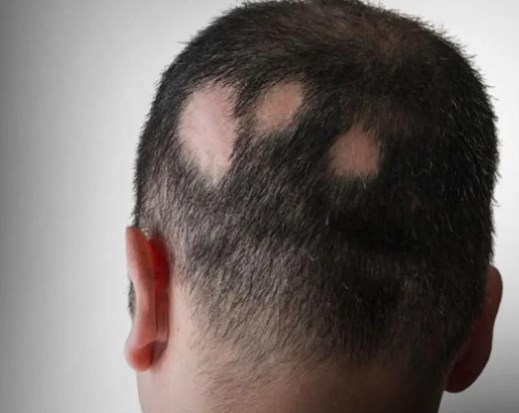



Alopecia areata is common and affects both sexes of all ages. It causes sudden hair loss, and the hair enters random stages of growth and regression. These stages may last for several years, although they cause hair loss, they do not destroy the affected person's hair follicles. They appear as small, circular spots devoid of hair. It negatively affects the patient's psychology as a result of noticeable changes in his appearance.
Symptoms of alopecia areata
Irregular circular spots of hair suddenly begin to fall out
Loss of all scalp hair (complete alopecia)
Loss of all body hair (alopecia universalis).
The area of hairless spots gradually expands.
Redness and weakness of the nails, or they become rough and gnawing
The appearance of white or gray hair in the affected areas
Treatment of alopecia areata
Corticosteroid injections
Topical medications, such as minoxidil
UV: Not widely used (high relapse rate)
Mild cases of the disease may resolve on their own
Factors that may increase the chances of infection:
Having an autoimmune disease such as lupus and vitiligo
Rheumatoid arthritis and thyroid disease
Family history
Hormonal changes
Some cases of Down syndrome
Taking some types of medications
Viral infections
Psychological problems
Diagnosis of alopecia areata
Through certain tests performed by the doctor:
Check the empty areas of hair
nail examination
Examination of follicles and hair
Other tests, such as the thyroid gland and hormones.
Q1: Is alopecia areata contagious?
No, alopecia areata is not a contagious disease, because it is caused by a defect in the patient's own autoimmune system and is not caused by a virus or bacteria.
Q2: Can hair grow back in areas affected by alopecia areata?
Yes, in mild cases, hair can grow back on its own, even without treatment
Q3: What is the difference between alopecia areata and hereditary baldness?
Alopecia areata is an autoimmune disease that suddenly attacks hair follicles, while hereditary baldness is a condition caused by genetic and hormonal factors
Q4: Does alopecia areata cause itching or pain in the scalp?
Alopecia areata usually does not cause any pain
Q5: What is the effect of alopecia areata on the psychological state of those affected?
Yes, it has a significant psychological impact on patients because it affects their external appearance. The patient may feel anxious and lose self-confidence, which may affect his quality of life and social relationships
Q6: Is there any treatment that can prevent alopecia areata from returning after recovery?
There is no cure to completely prevent the disease from returning, as it is an autoimmune condition, but available treatments can help control symptoms and stimulate hair growth.